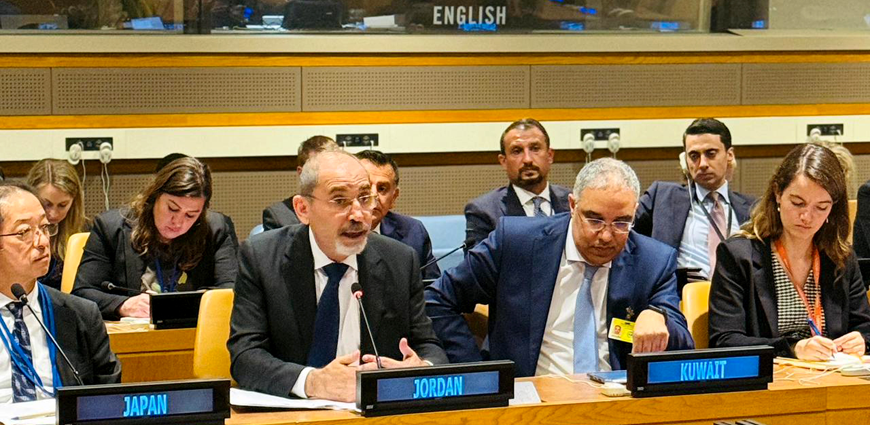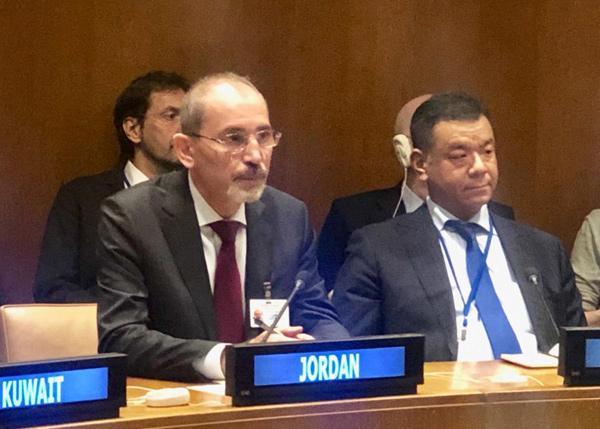You are here
FM takes part in series of meetings in New York
By JT - Sep 23,2017 - Last updated at Sep 23,2017
AMMAN — Minister of Foreign Affairs and Expatriates Ayman Safadi on Friday participated in the annual coordination meeting of member states of the Organisation of Islamic Cooperation (OIC) that was held on the sidelines of the UN General Assembly's 72nd session.
Participants in the meeting discussed several issues on the agenda, including the latest developments in the Middle East, anti-terrorism efforts and several organisational issues related to the OIC, the Jordan News Agency, Petra, reported on Saturday.
Safadi stressed Jordan's ongoing efforts to stop all unilateral measures that Israel is trying to impose on Al Aqsa Mosque/Al Haram Al Sharif, highlighting the Kingdom's continuous endeavours to safeguard Islamic and Christian sites in Jerusalem, under the Hashemite Custodianship.
The Palestinian issue remains the core of conflicts in the Middle East, the minister said, adding that there will be no stability or security in the region without settling the Israeli-Palestinian conflict on the basis of the two-state solution that guarantees the establishment of an independent Palestinian state within the pre-1967 lines, with East Jerusalem as its capital.
He added that such a state should live in stability and security side by side with Israel, according to international conventions and the Arab Peace Initiative that was reendorsed by Arab leaders attending Amman summit in March.
In remarks at a high-level meeting that discussed funding UNRWA, Safadi highlighted the importance of increasing the international support provided to the agency, so as to enable it to continue its vital role in serving Palestinian refugees until their issue is resolved in accordance with international legitimacy resolutions, Petra reported.
During the Friday meeting that was held under the joint patronage of Jordan and Sweden, the minister called for addressing the deficit in UNRWA’s budget, urging stakeholders to take concrete measures to ensure sufficient funding for the agency.
Safadi also took part in a ministerial meeting of the International Anti-Daesh Coalition, which was hosted by US Secretary of State Rex Tillerson in New York.
In his remarks, Safadi reiterated Jordan’s full commitment to closely working with the other coalition members and in cooperation with the international community to fight and eliminate terrorism, which, he said, poses a threat to the entire world.
Also on Friday, Safadi and his Norwegian counterpart Borge Brende co-chaired a meeting on youth, peace and security that was held on the sidelines of the UN General Assembly in New York.
During the meeting, in which UN Secretary General António Guterres took part, Safadi underscored the important role of youth in preserving peace and promoting development, as well as preventing violent radicalism, according to Petra.
He also highlighted the importance of empowering the youth, ensuring they receive better education, and creating a proper environment for their effective participation in building peace.
The minister also reviewed Jordan’s initiatives to promote youths’ participation in building peace and countering violent radicalisation.
He also referred to the UN Ssecurity Council’s Resolution No.2250 on youth, peace and security.
Safadi announced the formation of the “Youth Champions” group comprising a number of states, which aims at ensuring continued political commitment to youth agendas of peace and security.
The diplomat also met UN Special Envoy to Syria Staffan de Mistura on the sidelines of UN General Assembly meetings, with talks focused on efforts to bring about a political solution to the Syrian crisis, according to Petra.
Related Articles
AMMAN — Deputy Prime Minister and Foreign Minister Ayman Safadi on Tuesday met with UNRWA Commissioner General Philippe Lazzarini to discuss
AMMAN — Deputy Prime Minister and Foreign Minister Ayman Safadi and Swedish Foreign Minister Maria Stenergard co-chaired the ninth ministeri
AMMAN — Achieving economic development and improving the living conditions of Palestinians is not a substitute for their wider rights to sta














